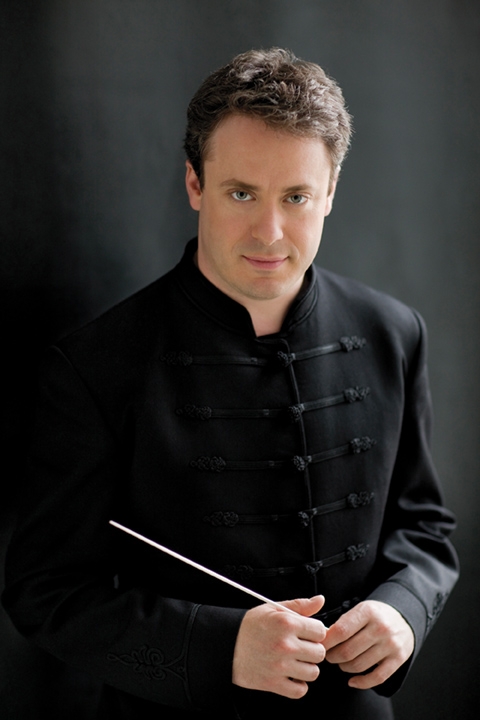“We are addicted to our devices, we are glued to screens for work, for entertainment and for our social lives — at some point we need to find something that can provide a break. And for many, this is music,” said Julian Kuerti, the Kalamazoo Symphony Orchestra’s new musical director.
Kuerti, who was born and raised in Toronto, Canada, said he thinks there is a real attraction to music that can teach people about themselves while demonstrating that instant gratification is not always the best form of gratification.
These core beliefs were among the qualities and characteristics that set him apart from four other candidates who also were under consideration for the job, which opened up after Maestro Raymond Harvey announced his decision last year to end his 18-year tenure with the KSO. Harvey is now the symphony’s first music director emeritus.
Steven Kreider, who chairs the KSO’s board of directors, said Kuerti rose to the top because he was very engaging as he interacted with key stakeholders, showed a great deal of interest in the Kalamazoo community, and came prepared with a thoughtful review of the symphony’s strategic plan and what the community is all about.
“It was evident that he was serious about this and that he had the credentials to take the KSO to another level,” Kreider said.
The next steps will undoubtedly include a focus on centenary celebration plans for the KSO, which was founded in 1921, as well as even greater efforts to attract younger and more diverse audiences.
Kuerti said the question of how to bring in the younger audience is often spoken of like the “Holy Grail” of classical music. He said the masterpieces of Western Classical music are some of the greatest works of art that our culture has produced, and he feels they will remain attractive to people for a very long time.
“What we need to do is try to make ourselves as a symphony more relevant to the daily lives of the people that we want to reach — and I don’t focus only on younger concertgoers,” Kuerti said. “We need to find ways to present the art in a way that doesn’t reduce its importance — or dumb it down. But there are definitely barriers to be shattered, social, economic, cultural — and these are things I constantly think about. In the programming of the symphony season, I will be trying very hard to reach new listeners of all types.”
This is music to the ears of Kreider, who said there is a broad recognition that concert-goers in general are aging and that the symphony needs to continue to develop a more diverse audience base.
Kuerti said he recognized the importance and value the KSO has to the community when board members and musicians traveled to Sweden to watch him conduct a concert.
“I was really taken by how passionate they were about the orchestra and the community,” he said. “When I conducted the (KSO) in May, that was when we discovered that there was a great chemistry between us, and from that point on, I knew this is what I wanted.”
Kuerti likens the importance of trust between a conductor and his/her musicians to that of a professional sports team or acrobatic troupe where there is a complete dependence on split-second timing.
“So naturally, we need to develop a deep trust early on, or else we can’t get very far,” he said. “The first phase for an orchestra is they will get to know what I like, what I want, and how my hands move — and I will get to know them, how they play, how they like to be directed. Once we feel comfortable with each other —and this could take a few concerts — then we will start building on ideas of style, balance, direction — and our relationship will deepen with every new experience.”
Even though Kuerti grew up in a musical family — his father, Anton Kuerti, is a pianist and his mother is cellist Kristine Bogyo — he did not decide to make conducting his life’s work until he graduated with honors from the University of Toronto, where he studied physics and engineering.
“I was performing on the violin by the age of eight, and I played chamber music, orchestral music and even solo with orchestra growing up in Toronto,” he said. “I was 24 years old when I made this choice (to be a conductor) and I have been doing it ever since.”
His goal with the KSO is to develop programming that is so captivating and so interesting, the entire community will get behind it.
“As music director, I will work hard to connect with the public and find out what resonates,” Kuerti said. “I believe that music is totally essential to living a happy life. What I do, what we do as an orchestra is try to bring symphonic music to our listeners to enrich them, and to enrich the entire community. But this only works if people are coming to listen.”





